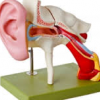Premier - Local Otolaryngologist
-
What is Otosclerosis
Otosclerosis is a condition characterized by abnormal bone growth in the middle ear, specifically affecting the stapes bone. The stapes bone plays a crucial role in transmitting sound vibrations from the middle ear to the inner ear.
-
Otosclerosis and Treatment With Surgery
The condition you are referring to is known as otosclerosis. Otosclerosis is a hereditary condition characterized by abnormal bone growth in the middle ear, particularly around the stapes bone, which is one of the three tiny bones (ossicles) responsible for transmitting sound vibrations from the outer ear to the inner ear.
When the stapes bone becomes fixed or stuck due to the abnormal bone growth, it cannot vibrate properly and transmit sound waves into the cochlea, the organ of hearing in the inner ear.



